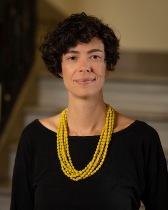Lydia Barnett
Associate Professor
Curriculum Vitae

- lydia.barnett@northwestern.edu
- 847-491-7421
- Harris 302
- Office Hours: By appointment only
Interests
Geographic Field(s): Medieval and Early Modern European History
Thematic Field(s): Gender and Sexuality History; Religious History; History of Science, Technology, and Medicine; Environmental History
Principal Research Interest(s): Early Modern Europe; History of Science; Environmental History
Biography
Lydia Barnett (Ph.D., Stanford University, 2011) is a historian of science and the environment in early modern Europe and the Atlantic World. She is the author of After the Flood: Imagining the Global Environment in Early Modern Europe (Johns Hopkins University Press, 2019), winner of the 2019 Morris D. Forkosch Prize, which shows how the religious imagination of global natural disasters played a key role in the emergence of a planetary environmental consciousness in European knowledge traditions well before the modern era of anthropogenic global warming.
Her current book project, Earth Work, investigates the relationship between local community knowledge, laboring knowledge of nature, and networks of transnational science during the Little Ice Age. Early research related to this project has appeared in History of Science ("Showing and Hiding," 2020) and Isis ("Eco-Prospecting in Early Modern Wetlands," 2023). Other current research projects include a transatlantic history of early modern wetlands and a history of fossils before the fossil fuel economy.
Her research has been supported by grants and fellowships from the National Science Foundation, the Woodrow Wilson Foundation, the Max Planck Institute, the Gladys Krieble Delmas Foundation, and the Michigan Society of Fellows, among others. After receiving her B.A. from Oberlin College in 2003 and her Ph.D. from Stanford University in 2011, she held positions at the University of Michigan and Bates College before joining the faculty of Northwestern in 2015.
At Northwestern she is Associate Professor of History and a faculty affiliate of the Program in Science and Human Culture, the Program in Environmental Policy and Culture, and the Trienens Institute for Sustainability and Energy. She is also co-leader of the Shifting Shorelines project (2024-2028), supported by Northwestern’s Buffett Institute for Global Affairs, which fosters interdisciplinary research on historical and present-day interfaces between land and water.
Publications
Books
- After the Flood: Imagining the Global Environment in Early Modern Europe (Johns Hopkins University Press, 2019) 264 pp. ISBN 9781421429519. Paperback edition (Aug. 2022) 978142144527.
- Winner, 2019 Morris D. Forkosch Prize, Journal of the History of Ideas
- Finalist, 2020 George Perkins Marsh Prize, American Society for Environmental History
- Finalist, 2020 Oscar Kenshur Prize, Center for Eighteenth-Century Studies at the University of Illinois-Bloomington
- Finalist, 2021 Turku Book Award, European Society for Environmental History and the Rachel Carson Center for Environment and Society
Selected Articles and Essays
- “Eco-Prospecting in Early Modern Wetlands,” Isis 114, no. 3 (Sept. 2023): 604-610. Special issue: “Geo-Resources in the Early Modern World”
- “Thinking with the Flood: Animal Endangerment and the Moral Economy of Disaster,” in Disaster in the Early Modern World: Examinations, Representations, Interventions, eds. Ovanes Akopyan and David Rosenthal (New York: Routledge Press, 2023), 75-98.
- “Showing and Hiding: The Flickering Visibility of Earth Workers in the Archives of Earth Science,” History of Science 58, no. 3 (2020): 245-274.
- “Giant Bones and the Taunton Stone: American Antiquities, World History, and the Protestant International,” in Empires of Knowledge: Scientific Networks in the Early Modern World, ed. Paula Findlen (New York: Routledge Press, 2019), pp. 225-45.
- “Strategies of Toleration: Talking Across Confessions in the Alpine Republic of Letters,” Eighteenth-Century Studies 48, no. 2 (2015): 141-57.
- “The Theology of Climate Change: Sin as Agency in the Enlightenment’s Anthropocene,” Environmental History 20 (2015): 217-237.
TEACHING AND ADVISING
Professor Barnett teaches widely in European and world history on topics such as science and medicine, natural disasters, and colonialism. She welcomes applications from potential graduate students intending to specialize in the history of science and/or the cultural, intellectual, and environmental history of early modern Europe. She is particularly eager to hear from applicants with an interest in the histories of water, climate, the earth and environmental sciences, Italy, and Europe-in-the-world as well as decolonial approaches to the history of science, climate, and the environment.
Courses:
- Early Modern Science and Medicine
- The Politics of Disaster: A Global Environmental History
- Europe in the Medieval and Early Modern World
- Nature and Empire
- Gender and Science
- Field Seminar in Early Modern European History
- The Anthropocene and the Environmental Humanities
- Global Environmental History: Water, Waterways, and Fluid Ecologies
Recent Awards and Honors
- 2023-24: Buffett Institute Global Connections Seed Grant
- 2022: E. Leroy Hall Award for Excellence in Teaching, Weinberg College of Arts and Sciences
- 2021-22: Howard Foundation Fellowship (deferred till 2024-25)
- 2021-22: Dibner Long-Term Fellowship, The Huntington Library
- 2016: Visiting Scholar, Max Planck Institute for the History of Science
- 2011-14: Postdoctoral Fellowship, Michigan Society of Fellows (declined 3rd year)
